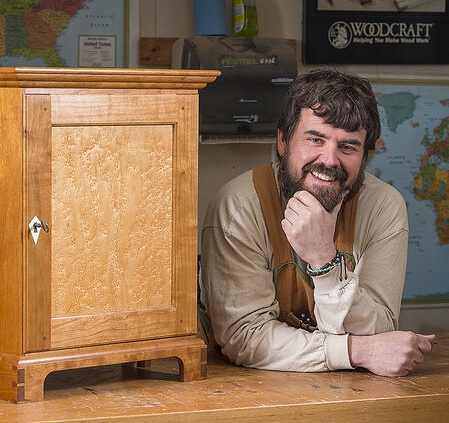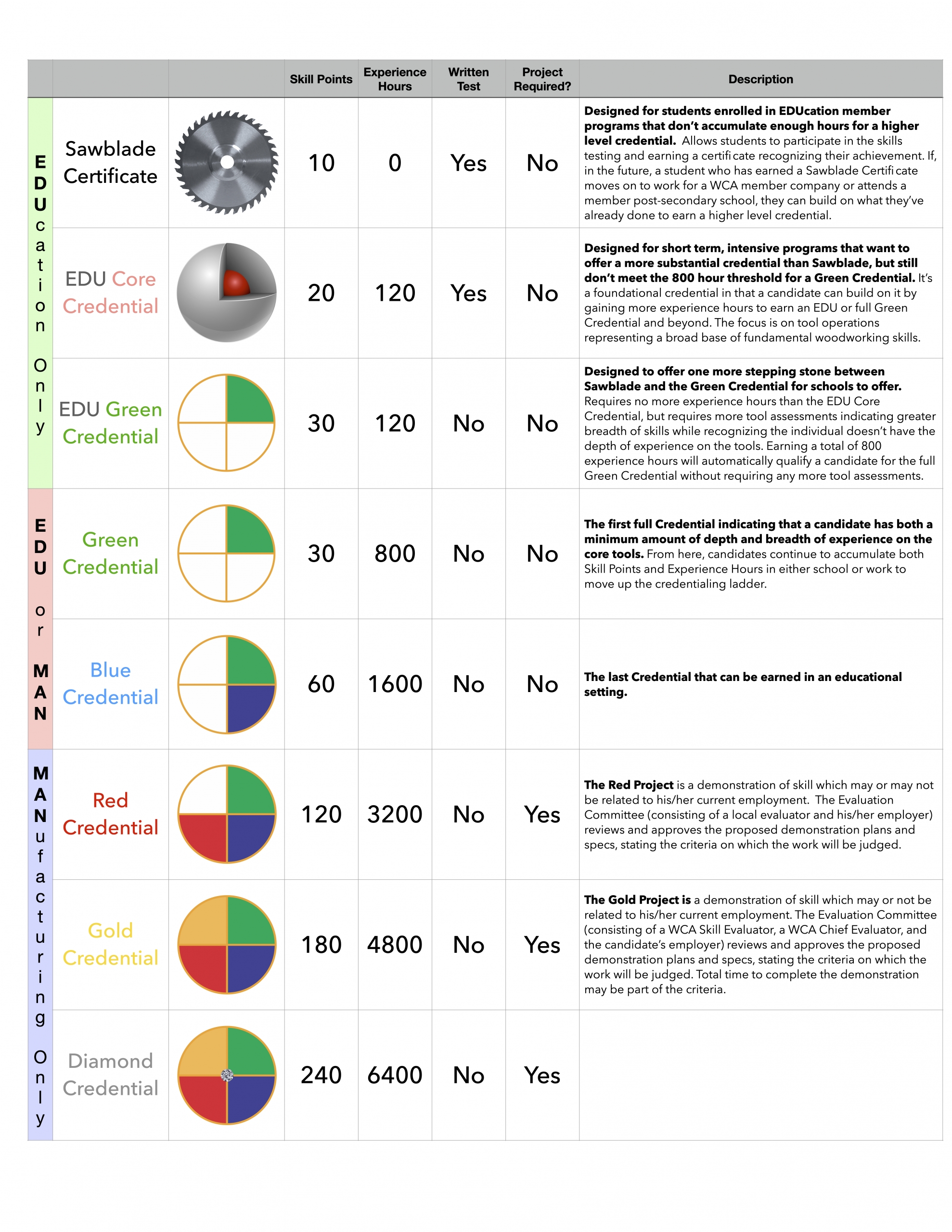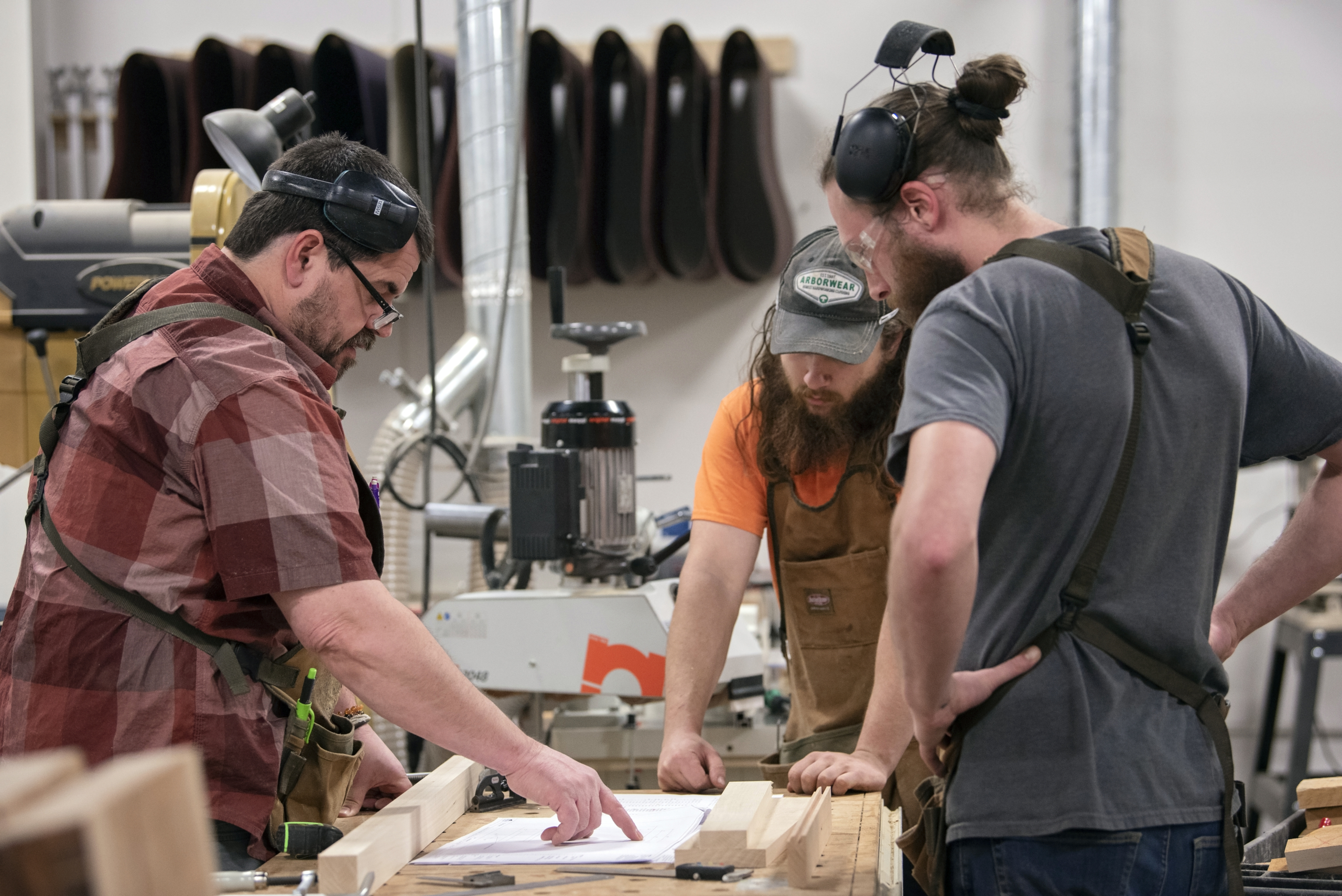
Instructor Chris Hedges goes over details for a project with the first students of Hocking College’s Cabinetmaking program Zane Drebus and Austin Ward. Photo by Delia Palmisano
The instructor of Hocking College’s new Cabinetmaking and Architectural Millwork program finds a job that melds his skills and passions.
Chris Hedges is an educator turned woodworker turned woodworking educator.
Hedges instructs the new Cabinetmaking and Architectural Millwork program at Hocking College in Nelsonville, OH. The two-year program, an EDUcation member of the Woodwork Career Alliance of North America, began in Fall of 2021. As if launching a degreed woodworking program wasn’t challenging enough, Hedges has also had to contend with doing so during a global pandemic.
“I started with three students, but now only have two,” Hedges says. “I think there have been a lot of factors for the low enrollment. The pandemic is only one of them. A bigger factor is that we didn’t get final accreditation for the program until about three weeks before the start of the first semester. We couldn’t advertise it as a degree program until we were accredited. While it’s been a slow start, I think it’s been the best for everybody. We’re already on track for at least three or four more students this Fall.”
Shifting Gears and Careers
Hedges has a Masters in Philosophy. He was in his third year of teaching philosophy and sociology courses full time at Ohio University when he caught the woodworking bug.
“It’s funny. I’ve heard other cabinetmakers say, ‘I grew up in woodworking. My great grandpappy did this,’ Hedges says. “I’m totally the opposite of that. My dad and grandfather were both doctors. They could barely hold a hammer. But I was fortunate to grow up in a house full of antiques. That gave me an appreciation for things made by hand that manifested when my daughter, Aedan was born in 2004. That’s when I suddenly felt this impulse to make something.”
The experience of creating a Craftsman-style dresser proved to be cathartic. Hedges gave up his teaching gig and enrolled at the University of Rio Grande’s Fine Woodworking program, intent on becoming a custom furniture maker. His instructor was master woodworker Lonnie Bird.
“It was a very traditional furniture making course; we used lots of hand tools,” Hedges says. “We mainly focused on making reproductions of classic pieces and a little bit on basic residential cabinetmaking.”
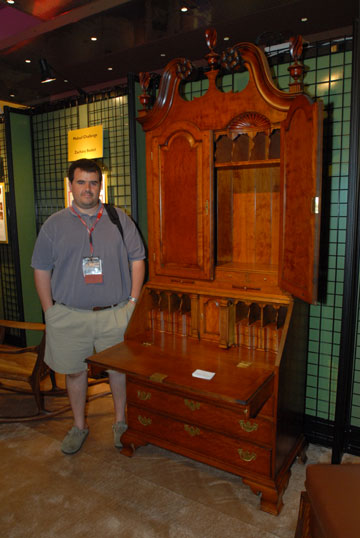
Chris Hedges won the Peoples’ Choice Award for his Penn Secrertary in the 2007 AWFS Freshwood compeition.
During his second year of the program, Hedges was a winner of the Fresh Wood student design contest at the 2007 AWFS Fair in Las Vegas. His “The Goose” Penn Secretary not only took first place in the Reproduction category for postsecondary contestants, it won the Peoples’ Choice Award.
“It took me nine months to build,” he recalls. “It was a nice validation of my new career choice.”
Like countless woodworking start-ups before him and since, Hedge’s first shop was a garage. “I was making nice reproductions, but it just wasn’t enough. I wasn’t making enough money. I had a young daughter, so I took a job working for Woodcraft down in Knoxville, TN. It was a fantastic experience because it helped me learn the business side of things.”
Hedges moved back to Ohio and returned to woodworking, running a small cabinet shop out of a shared-use warehouse in Nelsonville. “It just so happened that the director of the association who ran the warehouse was connected to Hocking College. They brought me in and asked I if would be interested in writing the curriculum for a new cabinetmaking program. I said, “Hell, yes!”
“I did all of the research, did all of the paperwork, and got lucky enough for everything to be accepted.”
WCA a ‘Perfect Fit’ for Hocking’s Cabinetmaking Program
Hocking College’s website describes the new degree opportunity as “a two-year intensive program designed to give students a hands-on education in the design, construction, and installation of commercial and residential interior architectural woodwork.”
Hedges says he signed his program up as a WCA EDUcation member because of its nationally-recognized credentialing program. “After looking at the few available options, it seemed like the WCA would fit right in with our program because their emphasis is primarily on technical skills. This isn’t a design college. Students are coming here to learn a set of technical skills and the WCA credentialling system recognizes the importance of those technical skills. A lot of times when students leave these programs potential employers really don’t care about what their portfolio looks like. What they want to know is that you know how to use the machinery and then they can teach you what they want you to build. WCA seemed like a perfect fit for us.”
Hedges quickly became one of the more active EDUcation members of the WCA. He was instrumental in advocating WCA certifications that plugged a gap between the basic Sawblade Certificate awarded in high school and postsecondary schools and the Green credential geared toward professionals. The result was WCA’s recent introduction of the EDUcore and EDU Green credentials. The former builds on the Sawblade certificate for more serious-minded students and the latter approaches the pro Green credential minus the shop hours that are too many for students to achieve in the vast majority of educational programs.
“Essentially, students who graduate from our program will be able to show a prospective employer a diploma and three separate certificates that reflect their progression of learning,” Hedges says.
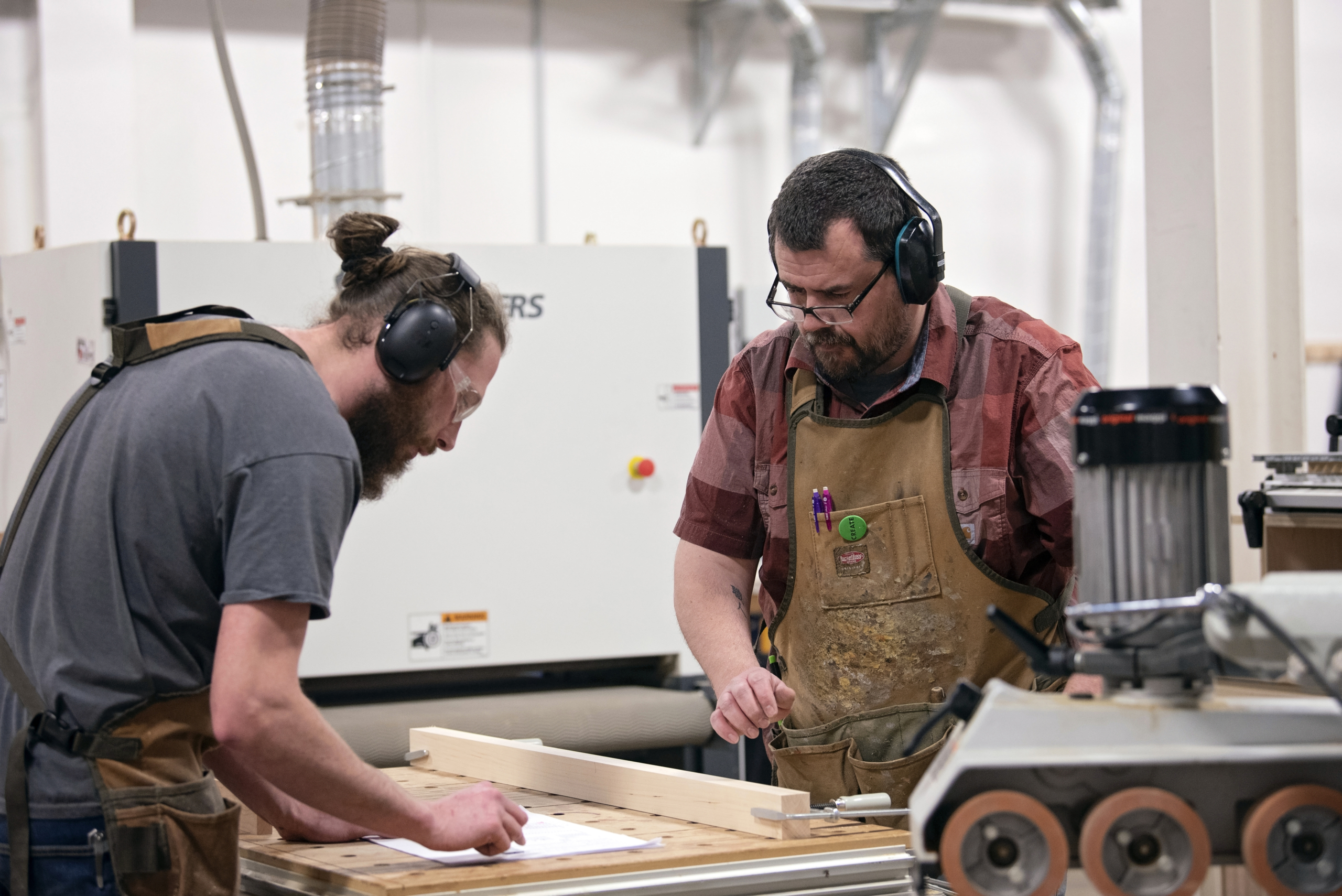
Photo by Delia Palmisano
In addition to learning how to safely set up and operate woodworking equipment, students are exposed to cost estimating, creating cut lists, basic finishing and design. They are also required to take classes like English, Math, and speech to hone their soft skills.
“Coming from a background in philosophy, I see cabinet making as more than just putting part A and part B together,” Hedges says. “It’s a way to think about the world. We need to foster intellectual engagement as part of the learning process. If I can teach these kids to use their minds as well to use their hands, I consider that successful.
“The more subjects you can introduce students to, the more well more rounded and prepared they will be for the world,” Hedges adds. “Being a cabinetmaker isn’t just standing at a bench. You have to present ideas. You have to be able to effectively communicate instructions to somebody to make something. That speech class is going to give them the confidence to do those things.”
‘From Forest to Furniture’
Adding Cabinetmaking and Architectural Millwork to its program roster was a natural fit for Hocking College. The college already had Tree Care and an associate’s degree in Forest Management and a certificate program in timber harvesting and tree care.
Indeed, in addition to its complement of standard woodworking equipment housed in its 2,000-square-foot lab, the program has a Wood-Mizer sawmill and slab flattener, as well as a Nyle dry kiln.
“This program was developed on the idea of forest to furniture,” Hedges says. “Hocking College has 2,500 acres of hardwoods in its portfolio. Students at this college can literally be involved all the way from harvesting timber to making a final product. We’ve also partnered with Rural Action, which has created a program to reach out to local land owners in the region to develop a plan to harvest timber and have it milled at Hocking.”
High Hopes
Hedges is optimistic about the future of his program.
“In this region of Ohio, we ship out 80 percent of our lumber with no value added, They just cut it down and ship it out,” he says. “For years, people in the community have been trying to get some kind of program in place where we could add some kind of value to that lumber. There have been maker spaces and community classes but this is the first formal education opportunity for people in the area to add economic and social value to their lives without having to leave the area.
“That’s another huge issue. We suffer from this huge brain drain problem. We have four colleges within 45 miles of where I’m at now but there’s no industry down here, there’s no technology, so all of these graduates get shipped out. They get their diplomas and they leave. We’re trying to improve the economic lives of the people who live here and make use of the resources where it makes sense.
“We’re still in phase one of development where we’ve built it and now have to make it work,” Hedges says. “My fingers are crossed that we’ll hit our maximum of eight students really quick. Our workspace could be more than doubled at some point. That’s the carrot that I’m reaching out for.”
Learn more about Hocking College’s Cabinetmaking & Architectural Millwork program.




